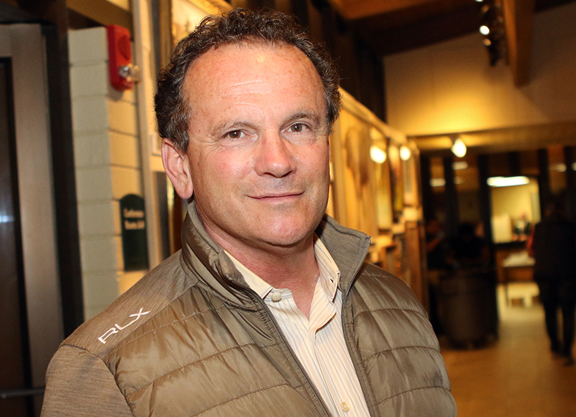With the smoking hot sire Violence picking up another Grade I win, with Volatile in the Alfred G. Vanderbilt H. at Saratoga, John Sikura has a lot to talk about and a lot to be happy about. The President of Hill 'n' Dale Farms, where Violence stands, has seen that stallion's career get off to a fast start, slow down and now take off again.
Sikura joined the TDN Writers' Room podcast presented by Keeneland to discuss Violence's recent accomplishments, the decision to bring in Kantharos and his thoughts on the 140-mare cap being imposed by The Jockey Club on all stallions born after 2019.
One of the things that has most impressed Sikura about Violence is the versatile nature of his offspring. The story this year has been his sprinters. Volatile is an Eclipse Award candidate and No Parole is undefeated sprinting and picked up the biggest win of his career in the GI Woody Stephens S. at seven furlongs.
“He's an interesting horse in that in his first crop, he got fillies, he got turf, he got two turns, and now he has two Grade I-winning sprint horses,” said Sikura, who was the Green Group Guest of the Week. “That bodes very well for the success of the sire, showing that versatility. He's multi-dimensional. He's a big, handsome horse. And it really couldn't come at a better time with the September sales right around the corner. He's proven he can get the racehorse of the ultimate ability and we're right back on track and heading upward.”
The breeding market can be so fickle that Hill 'n' Dale cut Violence's stud fee from $40,000 to $25,000 after a slow 2019. He was the number-one sophomore sire of 2018.
“My confidence in the horse has really never wavered or shaken, but the reality was we provided a price break this year because stud fees should be dependent upon not only sales success, but racing success,” Sikura said. “Too often, people don't see that both ends of the business are interconnected and you sell these yearlings to be racehorses. I think you should be buoyant in terms of success, when horses are winning at the highest level and I think the breeder deserves a break when things are quiet.”
In the fall of 2016, Stonestreet Stables announced that Kantharos would be moving from Ocala Stud in Florida to Hill 'n' Dale. He was the leading active sire in Florida at the time. Sikura conceded that a lot of guesswork goes into the equation when transferring a sire from a regional market to Kentucky.
“It's much like a high school athlete that is going to play in a local college and be successful, or can you play at a D1 school, whatever the sport might be, and succeed?” he said. “You have to have a feel for it. You're betting on the horse and you're betting that the quality of marriage that he bred, the success that he's had, is really disproportionate to the opportunity in a positive way. I looked at Kantharos, and I looked at the stakes winners, and looked at his winners. Then I started to see horses become graded stakes winners and that was very exciting. Then, with XY Jet and World Of Trouble, you're starting to get Grade I winners and champions. He was a really good racehorse. He threw a good type, and we believed that he would certainly fit a niche in the Kentucky marketplace. The hope is always that without limitation, he will continue to ascend the sire ranks and go to the next level.”
Though Hill 'n' Dale does not typically breed its stallions to huge books of mares, Sikura is not a fan of the new Jockey Club rules. He says they create a playing field that is no longer level because stallions that were grand fathered can breed to far more mares than those who were born after 2019.
“Whatever the rules are, they must be applied equally to everybody,” he said. “And if it's going to be 140 mares, then there has to be a year under which every stallion that breeds in North America must comply with and have the same rules. We talk about this lack of consistency. The Jockey Club complains about the lack of consistency in different jurisdictions as far as medication, various control issues. Now they have an edict that sort of gets right in the middle of free enterprise, free commerce. I believe in fairness. I believe in competition, but I don't believe in any competitive edge. If genetic diversity or the concentration of one sire in the sales ring, giving more opportunity to others is the goal, and if it's an immediate and anxious goal, and important to the industry, which they state as the premise for the rule, then it must apply the same day to everybody.”
The Writers' Room also discussed the return of Maximum Security (New Year's Day), the winner of the GII San Diego H.
In the West Point Thoroughbreds news segment, the writers discussed this weekend's stakes races and an incident involving jockey Hector Caballero. On Monday at Parx, Caballero struck his mount in on the neck or shoulder with his whip after the race had concluded.
Click here to watch the podcast on Vimeo.
Click here for the audio-only version.
Not a subscriber? Click here to sign up for the daily PDF or alerts.






